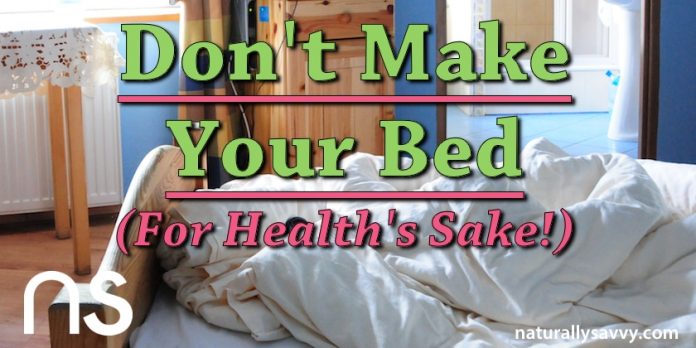
Mothers and grandmothers may reel in confusion while kids shout with joy, but researchers have made it official: don’t make your bed.
I loved my mother, so I dutifully made my bed every morning until I left home. After that, I can truthfully say that as an adult, I rarely make my bed. (Full disclosure: I never had kids, so I can’t say with 100% certainty I would have sanctified this behavior for them as well…but I have a feeling I would have done so.)
It turns out that my rebelliousness against making my bed can be supported by scientific research. In fact, an untidy bed is an unwelcome environment for house dust mites. And that’s a good thing for your health.
Read more about why you absolutely must stop wearing shoes in your house
Here’s the scoop:
Whether you know it or not, none of us sleep alone. Once you subtract any human and pet companionship from your bed, you are still not going solo because there are probably about a million house dust mites sharing your sheets. No matter how clean you keep your house, you cannot completely eliminate these microscopic cousins of the spider.
But according to researchers at Kingston University, while house dust mites thrive in a warm, moist environment (e.g., when you are sleeping under the covers and in your PJs), they are not fond of the dry, warm environment associated with an unmade bed. Therefore these critters, which feed on the dead skin your body sheds during the night, are happy (if mites can feel pleasure!) if you cover them up neatly every morning but less likely to live through a less moist day among disheveled sheets and other bedclothes.
Specifically, according to Dr. Stephen Pretlove, “Something as simple as leaving a bed unmade during the day can remove moisture from the sheets and mattress so the mites will dehydrate and eventually die.” Given that house dust mite allergens are a trigger for many children as well as adults with asthma, reducing exposure to these spider-cousins is important.
Of course, if you live in a humid environment, not making your bed may have little impact on the house dust mite population. If you believe every little bit helps, however, then not making your bed could be one more thing on the list of ways to reduce house dust mites. Here are a few more items on that list:
- Wash your bedding once a week in hot water to kill dust mites. If you’d rather not use hot water on your bedding, then both washable and nonwashable bedding can be frozen overnight to kill the critters. (Gives a whole new meaning to crisp sheets!)
- If your child sleeps with stuffed animals, wash these toys weekly (or you can freeze these too.)
- Use a dehumidifier or air conditioned to keep the relative humidity at 50 percent or lower in your bedroom.
- If possible, avoid carpeting, upholstered furniture, and fabric curtains in bedrooms.
- When dusting, use a damp rag or mop, because dry cloths stir up mite allergens.
- Use impermeable covers for your mattress and pillows. (Note: According to a recent study concerning the use of such coverings to keep out house dust mites to help prevent allergic symptoms, “No evidence was found to support the use of impermeable mattress covers in the primary prevention of allergic disease or in the tertiary prevention of allergic disease symptoms.”)
- To trap dust mite allergens, use a vacuum cleaner with a HEPA filter or a double-layered microfilter bag.
Read about green cleaning routines at home
So whether you are a mom who constantly argues with her kids to make their bed, a kid who’s looking for an excuse to skip this chore, or someone of any age who is just tired of making the bed but hasn’t found a solid reason to stop, this study is for you. And I’m writing this with a clear view of my unmade bed.
Image via Jess Pac




